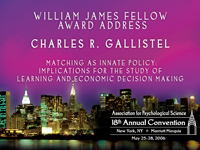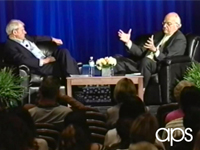Member Article
Presidential Symposium: The Medium Is Still the Message
“Can we talk?” Joan Rivers’ signature catchphrase is something psychologists might consider adopting, at least according to a panel of eminent journalists talking about “The Mind in the Media” at the APS 18th Annual Convention. For the audience, it was in part an object lesson in the disconnect between the world of science and the world of the popular press when it comes to communicating about research findings.
In a freewheeling tough-love kind of discussion, moderated by APS President Michael Gazzaniga, the panelists — NBC senior science correspondent Robert Bazell, New York Times science editor Erica Goode, Wall Street Journal deputy opinion editor Daniel Henninger, New York Times columnist and Dana Foundation chair William Safire, and author Tom Wolfe — all agreed that psychologists need to get out more, figuratively speaking. The panel told the psychologists they need to be not only more like the raunchy, hoarse-voiced Rivers, but also as confident as Darwin, as ambitious as Marx, as imaginative as Freud, and as charming a storyteller as Jesus or Mohammed.
“The problem of the media and the mind is not with the media; it’s in the people who work on the mind, these people,” said Safire, gesturing to the hundreds in the audience. “Whose responsibility is it to get across the messages of what science is doing and to stimulate people to support science? It’s not essentially the media’s job. It’s the scientists who have the responsibility to get out of the Ivory Tower.” He went on to talk about the charisma of John Watson, co-discoverer of the structure of DNA, and a meeting Watson set up between 30 of the world’s top neuroscientists and what Safire called “a huckster,” a marketing specialist. The huckster, Safire explained, told the eminent crowd: “You’re wondering why brain science is not interesting anybody and the answer is that you’re not interesting.”
“You’re doing fascinating work,” Safire went on to tell the APS crowd, “but who would know? You’re afraid to go on the air. You don’t want to appear to be pushy. And you’re nervous about anything you might say that isn’t 100 percent accurate. And so you don’t give people hope, which is why so much money and attention instead goes to breast cancer and AIDS.”
Even if psychological scientists can’t always give people definitive answers, Wolfe argued, they should at least be able to offer the public some scrap of imagination, images, or metaphors or connecting-the-dot insights unknown to laymen. Freud, Wolfe said, was suspect in many of his conclusions. “But he was a brilliant, brilliant writer.” Sure, he’d be so reductive a spoilsport as to claim that “sometimes a cigar is just a cigar,” but, Wolfe reminded everyone, “How seldom he left it at that! He also said it might be something else.”
Goode — who has a master’s of science degree in social psychology— countered that psychologists aren’t wholly to blame. Sometimes journalists have unfair expectations of psychologists. “We all have, in the journalism profession, ADHD,” she said. “And we can ask questions that have no answers that psychologists [who], when you talk to them, give really sensible-sounding answers, but they’re probably the same answers you could get from going out into the street and asking 10 random people. It’s not the right way to use psychologists in stories.”
Still, the overwhelming lesson the panelists tried to hammer home was that researchers need to examine their work through the lens of human interest and emotional resonance to have even a chance of increasing public understanding of psychological science. Conveying ideas and making them stick means packaging them in a way that scientists often don’t appreciate.
In other words, the medium is still the message.
In the example of Watson’s DNA discovery, the popular notion is quite romantic: The double helix came to him in a dream of two intertwining snakes. Not the reality, in which the research was driven by analyses of X-ray phenomena. The irony of psychological research, then, is that it is both intimate — your inner thoughts, your subconscious, your desires and instincts — and stale — fMRI scans, standard deviations, spreadsheets, and logical extrapolations. While the panelists didn’t go so far as to say psychology is devoid of charisma, the point was that mojo was sorely lacking.
Everybody’s a Psychologist
It is undeniable, Henninger asserted, that people “fail or succeed by dint of their personalities. I think the current president’s problems in large part stem from the fact that there’s something about his persona, his body language, that rubs people the wrong way. At the other end of the spectrum you had Bill Clinton, who in the minds of many people can do no wrong because he’s such a great guy, such a great personality; so it didn’t make any difference what he did while he was president.”
Ah, if only it were that simple. But there are a lot of people out there who think that way and who don’t hesitate to describe the world in terms of their personal theories of behavior. That’s one of the differences between psychology and other sciences. When’s the last time you overheard someone explaining their take on, say, quantum physics? But it probably hasn’t been but a few minutes since you last heard someone explain their own or another’s behavior in terms of some underlying characteristic or external situation. (‘She’s a Pisces – nuff said.’) It’s a blessing and a curse to study something so interesting that everyone has a theory about it. The goal, of course, is not merely to be all spark and sizzle. Bazell offered one example of pop psychology gone awry: “The concept of the split brain, of left brain/right brain, has made it so much into the popular culture that it’s probably used as an explanation for two thirds of human behavior — certainly for our entire political system. Real psychology, very good science, can get turned into metaphors.”
The need for balance was illustrated in a warning from Henninger: “I think there’s a cautionary tale in what happened to physics. It became so abstruse and so difficult that it was impossible for the general public to have any idea of what it was about. And I think if a discipline allows itself to get to that point … the public loses interest. And if the public loses interest, there’s a money consequence to that.”
Even when the public is interested and well-informed by the media about science, there are still barriers that are beyond the reach of either researchers or journalists. “I think the public knows plenty well what stem cells are to make their decision,” said Bazell. “It’s just that some people believe that a pinhead-sized embryo is something sacred and where that comes from is a different question. I think they understand the science very well. They understand that it may well be a treatment for Parkinson’s disease or other illnesses but it comes down to their beliefs — it doesn’t come down to a lack of scientific understanding.”
An Overrated Species?
Turning the tables on this distinguished group, Gazzaniga wrapped up the session by asking the kind of impossible-to-answer question the media so often expect psychologists to respond to eloquently and decisively. “You’re all dealing with the nature of our species in some way,” Gazzaniga began, “and so … I’d like to have a vote on what do you think about human nature? Do you like it? Are we trying to prop up a bad species here? What’s going on?”
Bazell: “I would say of human nature: what’s the choice? What else do we have?”
Henninger: “I love human nature, maddening though it may be. It’s like that famous Lily Tomlin line: ‘I try to be cynical, but it’s hard to keep up.’ And I feel that way all the time. It’s the nature of the news and the media; it throws so much at you and you have to be processing so much all the time … but you have to revert to the mean. I try to keep that baseline in mind when dealing with all the distortion and perversion and exaggeration that one encounters in the news these days.”
Goode: “I think we’re an overrated species. I’ll leave it at that.”
Wolfe: “I am endlessly fascinated by the adventures of the human beast. The acute human comedy will never desert us. But I think 98 percent of the nature of man is based on those things possible only through the use of speech. Our history began when we acquired speech. Speech was like a nuclear weapon compared with any other force in nature.”
Safire: “When you look back over the last 50 or 75 years and the human species, you see these enormous advances in science where you are actually extending the life of a human being from 47 in 1900 to 77 today. So we’re racing to make our lives more nourished and enriched as we get older. It’s a remarkable advance. This good thing that’s happening, both in science and in politics is unstoppable. And so, with all the faults we have, I’m a big optimist about the human species.”




APS regularly opens certain online articles for discussion on our website. Effective February 2021, you must be a logged-in APS member to post comments. By posting a comment, you agree to our Community Guidelines and the display of your profile information, including your name and affiliation. Any opinions, findings, conclusions, or recommendations present in article comments are those of the writers and do not necessarily reflect the views of APS or the article’s author. For more information, please see our Community Guidelines.
Please login with your APS account to comment.